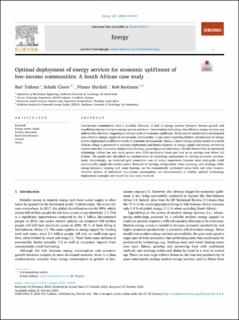| dc.contributor.author | Tulkens, Bart | |
| dc.contributor.author | Cloete, Schalk Willem Petrus | |
| dc.contributor.author | Muvhali, Pfunzo | |
| dc.contributor.author | Bastiaans, Rob | |
| dc.date.accessioned | 2024-04-11T13:09:52Z | |
| dc.date.available | 2024-04-11T13:09:52Z | |
| dc.date.created | 2023-11-15T13:44:10Z | |
| dc.date.issued | 2023 | |
| dc.identifier.citation | Energy. 2023, 285: 129444. | en_US |
| dc.identifier.issn | 0360-5442 | |
| dc.identifier.uri | https://hdl.handle.net/11250/3126154 | |
| dc.description.abstract | Low-income communities face a causality dilemma: A lack of energy services hampers income growth and insufficient income hampers energy service provision. Interventions delivering cost-effective energy services can address this dilemma, triggering a virtuous cycle of economic upliftment. While several studies have investigated cost-effective energy supply to low-income communities, a gap exists regarding holistic optimization of energy service deployment at different levels of economic development. Hence, a novel energy system model of a South African village is presented to optimize deployment and hourly dispatch of energy supply and energy services to recover time lost to poverty-related activities (e.g., gathering wood and water). Results showed that an optimized technology rollout can save each person over 1500 productive hours per year at an average cost below 0.2 $/hour. The model also identified the optimal order of technology deployment for driving economic development. Interestingly, an electrical grid connection was of minor importance because local mini-grids could economically supply the modest power demands of lighting, refrigeration, water pumping, and cleaning, while energy-intensive cooking and water heating can be economically performed using fuels and solar heaters. Detailed studies of individual low-income communities are recommended to outline optimal technology deployment strategies and reveal the low costs involved. | en_US |
| dc.language.iso | eng | en_US |
| dc.publisher | Elsevier | en_US |
| dc.rights | Navngivelse 4.0 Internasjonal | * |
| dc.rights.uri | http://creativecommons.org/licenses/by/4.0/deed.no | * |
| dc.title | Optimal deployment of energy services for economic upliftment of low-income communities: A South African case study | en_US |
| dc.title.alternative | Optimal deployment of energy services for economic upliftment of low-income communities: A South African case study | en_US |
| dc.type | Peer reviewed | en_US |
| dc.type | Journal article | en_US |
| dc.description.version | publishedVersion | en_US |
| dc.rights.holder | © 2023 The Authors. Published by Elsevier. | en_US |
| dc.source.pagenumber | 14 | en_US |
| dc.source.volume | 285 | en_US |
| dc.source.journal | Energy | en_US |
| dc.identifier.doi | 10.1016/j.energy.2023.129444 | |
| dc.identifier.cristin | 2197092 | |
| dc.source.articlenumber | 129444 | en_US |
| cristin.ispublished | true | |
| cristin.fulltext | original | |
| cristin.qualitycode | 2 | |

